The Black Jackals Read online
IAIN GALE
The Black Jackals
For Susie
Contents
Cover
Title Page
Chapter 1
Chapter 2
Chapter 3
Chapter 4
Chapter 5
Chapter 6
Chapter 7
Chapter 8
Chapter 9
Chapter 10
Chapter 11
Chapter 12
Chapter 13
Chapter 14
Chapter 15
Chapter 16
Chapter 17
Chapter 18
Chapter 19
Chapter 20
Chapter 21
Historical Note
About the Author
By the same author
Copyright
About the Publisher
Chapter 1
This had not been what was meant to happen. Not at all. But then he supposed that was what war was all about – the unexpected and the absurd always turning up just when you’d planned for something completely different.
Second Lieutenant Peter Lamb stared at the bridge and swore under his breath. This was not going according to plan. Certainly, the sappers had come and gone as directed. They had left their packages of high explosive, taped and tied to the bridge, out of sight of anyone who might attempt to cross it, and they had carefully concealed the wire in the long grass that grew up the riverbank, snaking it back as covertly as possible to Lamb’s command trench, where it was connected to a simple plunger. Lamb gazed at the box and its T-shaped handle. When the time came, when the Germans began to show themselves, he would give the command and the little bridge which had presumably stood here at Gastuche for the last century would vanish.
That at least was the plan. But this was no training exercise. This was war, and the Germans had not come along the road obligingly in column like some friendly adversary to be mown down by his carefully prepared ambush and then blown to kingdom come with the bridge. In fact they had not come at all. Instead Lamb had been alarmed to see, some hours ago now, a procession of weary Belgian civilians advancing upon the bridge. He had told the men to hold their fire, but of course it had hardly been necessary. They were not about to open fire upon a herd of old men, women and children. At first he had watched them with bemusement as they had trickled across the bridge towards safety. But then the thought came to him. If this exodus did not stop then eventually the Germans would be caught up in it, and what would he do then? He did not suppose for one minute that his men would fire on civilians, but the enemy must not be allowed to take the bridge.
It was obvious to him that there was no choice. His orders were clear. Nothing for it now but to blow the bridge, and he wondered when he gave that command how many of them would have to die.
Peering over the brow of the shallow grassy slope behind which he and his men were sheltering, Lamb looked down towards the river and its little stone bridge and his eyes fixed on the desolate column of humanity moving slowly and sadly along the road towards them – an endless procession of men, women and children, driving, pushing and pulling carts and wagons of all shapes and sizes, laden with what few belongings they had managed to gather together before the Germans came.
The River Dyle was a good enough obstacle against tanks, and to allow the bridge to fall into enemy hands was out of the question. But it was also highly questionable that they would be able to hold it forever. The German advance through Belgium had been like a whirlwind and he wondered how many of the British, Belgian and French generals really believed that their armies and the tiny British Expeditionary Force would be able to hold back the Panzers. But they might be able to slow them down sufficiently for the French to be able to regroup and mount a counter-attack.
He had sent a runner back to Battalion at the first sight of the refugees but had received no other instruction than that it was had on good authority that anyone carrying a red blanket might be a fifth columnist. As far as Lamb could see, hundreds of these refugees had red blankets. He could not possibly have taken them all prisoner and so he had decided to ignore the instruction. It galled him that he was becoming used to ignoring orders. Only some of them, of course. This was typical of the sort of ridiculous rumours that had been circulating since they had arrived in France. He was surprised, though, at how readily people accepted them, officers and men alike, and it made him wonder whether he might have been wrong in placing so much faith in the army, and that new and unwelcome doubt filled him with dread. For it was not hard to see that their enemy had no such lack of confidence.
There was distant booming, somewhere quite far off, over to the east. Lamb raised his head again and, looking across the peaceful landscape in which a pale herd of cattle were grazing beside the arc of a river, scoured the horizon. But he could see nothing. They were still far away, then. But still close enough at that, he thought. And somewhere out there someone was taking a pounding, and ten to one it wasn’t the Boche. There was a rustling noise behind him and Lamb turned to see his platoon sergeant, Jim Bennett, crouching above the trench.
‘Beggin’ yer pardon, Mr Lamb, sir. But the lads were wondering if they could stand down for a few minutes and get a brew on. And one for you too, sir?’
Lamb nodded. ‘Yes, Sarnt. That should be fine.’
The booming noise came again.
‘Did you hear that? Sounds as if the Belgians are getting it badly. Still holding them, though.’
‘Reckon they’ll manage it much longer, sir?’
Lamb smiled. He knew from the adjutant that the entire 3rd Division had been pulled back from the forward Belgian lines after some trivial dispute between their general and the Belgian commander who reckoned his men better trained than the British army. It was madness. But the Belgians would rather fight on their own than submit to foreign command. So now it was only a matter of time.
‘Not really, Sarnt. Do you?’
Bennett grinned. ‘They’re brave enough, sir. Don’t get me wrong. I’m not saying they’re not. But you saw them come past here yesterday, sir. Couldn’t get away fast enough. I give you that what’s left up there must be better than that shower, but if you want my opinion, Mr Lamb, them Belgians couldn’t hold back a platoon of Girl Guides, let alone Jerry.’
Lamb nodded. ‘My thoughts too, Sarnt. We’d best stay alert. You’d better get that tea on or they’ll all want some.’
As if to qualify his words, Lamb retrieved his tin helmet from where it had been lying on the parapet and placed it on his head, pushing the strap tight beneath his chin. Bennett nodded and ran crouching back to his trench.
Jim Bennett was the linchpin of Lamb’s platoon. Had been since the start. While Lamb knew that the men would not question his word, he also knew that they would take a command more readily from Bennett, knowing that he was one of them. Lamb was an officer and as such came from another world. Another country. It was what the men expected but it made the sergeant’s role absolutely vital.
In fact, Lamb mused, he was not perhaps as much of a ‘gentleman’ as his men might suspect. For the past hour he had been trying to compose a letter to his ex-wife, Julia. With little success. How did you write to someone to tell them that while you expected to be killed at any moment you had never stopped loving them, despite being unfaithful? He had embarked on the affair in the year that Hitler had come to power. His life with Kate was nothing like his marriage, where society ball had succeeded house party as his social life had jostled for position with his promising career as a London lawyer. He had met Julia at university, and they had married in haste. But Kate he had known since boyhood, and a chance encounter had led to a torrid affair which had put an end to his marriage. It was
not sordid. Not in the way that Julia had made out in court. Of course he had not meant to betray his wife, but some uncontrollable urge had taken hold of him. Lamb prided himself on his ability to organise and control his feelings just as he did his men, and this uncharacteristic slip troubled him. He understood now that it must have been love. But now – now he just wanted to get home. To get back to some sort of normality and to the woman he wished he had never betrayed. He wondered when it would be over, whether they had any chance now of driving the Germans back across the Belgian border. The latest reports had not been good.
They had crossed from France two days ago, an expeditionary force of almost 250,000 British troops plus all their cumbersome logistical support, sent to help the French as they had in 1914 when Lamb’s father had gone with them as a keen-eyed volunteer in the regiment to which he himself now belonged, the Royal North Kents. Number 1 platoon, B Company. Most of the army had been in France since last October. The ‘phoney war’, they had started to call it, and in truth it hadn’t been bad. The North Kents had remained in England, in camp close to Tonbridge, training to embark. He’d managed to get out of the camp on a few occasions, to take one or two of those fellow officers he counted as real friends – Freddie Long, Jimmy Bourne – to the haunts of his youth, good English pubs with friendly landlords and patrons more than ready to stand them a few drinks. That had been Lamb’s phoney war. A few of the men had gone ‘AWOL’ and there had been the usual problems of the new men not knowing the ropes, but by the time they had crossed the channel in April he reckoned that Number 1 platoon was pretty sound. Which, although he wouldn’t have admitted as much, made it something of an exception in the regiment. And that worried him.
They’d been brigaded with the Berkshires and the Durham Light Infantry in 2 Division, which in Lamb’s mind affirmed the quality of his regiment. And now here they all were, the platoon, the regiment, the division and the entire BEF, strung out twenty miles along the river Dyle, in hastily dug trenches most of them, like Lamb’s, on the steep slopes that ran down to the river. Waiting for the enemy. Lamb sensed their frustration.
The men had been filled with enthusiasm for their task. The ‘phoney war’ was finally over, the real war was on. The Belgian people had welcomed them with kisses and cheers, showers of flowers and cigarettes and chocolate. Lamb had believed, as they all had, that the Belgians might hold the line along the Albert canal. But that illusion had been shattered on their second day at what they now knew to be ‘the front’, when the sound of gunfire had cut through the early sunshine of Whitsunday morning, 14 May. His fears had been confirmed by the sight of hundreds of Belgian troops streaming back along the road across the river. A few of the lads had grinned at them as they had stumbled blindly past, but the more seasoned of them, Lamb included, had turned their heads away, chilled at the sight and not wanting to be touched by the Jonah of a retreating army.
Not long afterwards a runner had come up from Battalion to deliver the order he already had that they should do nothing but hold their ground and prevent the enemy from taking the bridge. But Corporal Briggs had quizzed him and found out that the word was that in the north the French too were retreating towards Antwerp, and Holland was lost. That had only been yesterday.
Lamb scanned the horizon again now for any sign of the enemy and strained his ears for the sound of engines that might have signalled the approach of trucks or tanks. Nothing. He glanced to the left and saw the men of his platoon sitting, hunched like him in their slit trenches, and wondered what thoughts were passing through their minds. Whether there was anything they too had left undone, left unsaid. It was not like him to leave loose ends. But then with Lamb his personal and professional lives had always been very different. He pressed down again with the pencil on a fresh sheet of his pocket book, and the thing snapped in two. Lamb swore. Like everything they had been given to take to this war, even the bloody pencils were third rate.
Lamb reached deep down into the breast pocket of his battledress tunic and fished out the spare he always carried. He was a natural soldier – organised, meticulous and particularly good at preparation. How then, he wondered, was it that he had allowed his private life to become such a damned mess? After the divorce he had fallen out of love with the law and returned to his first obsession. For the past seven years he had been the manager of a garage in Sevenoaks High Street. Motorbikes were his speciality, but he could turn his hand to anything mechanical. They said he had a magic touch. Wednesday evenings, though, he had devoted to the Territorials. The army suited him, even as a part-time soldier.
He needed to belong. At twenty-five he had been older than most of the recruits in his Territorial regiment, but when war had come at last the regular army had been only too glad to have him as an officer. Some of his fellow officers had been similarly recruited from the Territorial units although the core were professional soldiers. Two were fresh out of Sandhurst, straight from public school, and seemed to regard Lamb as they might a kindly uncle. He of course had merely converted from Territorial to regular officer and so had missed out on that venerable institution and its notorious training regime.
He loved the regiment and all that it stood for. The officers’ mess at Tunbridge Wells was a darkly panelled haven of the old world, in which men who outside the army would never have enjoyed the luxury of servants took readily to a life where the stewards glided noiselessly between them bearing silver trays of whisky and champagne. The regimental history, portrayed so vividly in paintings around the walls of the mess, was as illustrious as any in the British army, and the colours that hung in the chapel bore honours including those of Tangier, Blenheim, Talavera, Waterloo, Sevastapol, South Africa, Ypres, the Somme and Arras. Officially the Royal North Kents, which had been raised during the Civil War, were known by a number of names, derived from their history: the 100th Foot; the Centurions; Boadicea’s Bodyguard; the Tangier Tigers. One of his favourites was the Bordello Boys, which was derived from a famous episode at the Battle of Oudenarde in 1708 when the regiment had occupied a strategically placed brothel. But when he thought of the regiment it was always of the nickname derived in part from the animal on its cap badge, in part from the jet-black, cross-braided dress uniform worn by officers on mess nights. The North Kents would always be the ‘Black Jackals’ to him. Such things were important to Lamb. Heritage gave the men a sense of pride, a reason to fight and a reason to obey without question.
But he wondered what real use tradition might be against the enemy they now faced, an enemy expert in a new sort of warfare led by commanders who nursed bitter resentment over their nation’s last humiliating defeat thirty years ago. The British army might be the best in the world in its heart and soul, but for years it had been starved of resources at the expense of the RAF and the Navy. That would be the way to win any future war, the experts had said. Well, he wondered where those ‘experts’ were now. Not sitting here, that was for sure. It occurred to him that his little band of thirty men, No 1 platoon, were equipped in almost exactly the same way that his father’s platoon would have been when they had sat in almost exactly the same place twenty-five years ago. What had they learned? he wondered. Precious little. The Germans had cut a swathe through Europe with their Blitzkrieg tactics, and Lamb sensed that it was not just the Belgian soldiers who might be outmatched. His men would stand and fight and die if they were ordered to. But without the right weapons and equipment, he knew they would be quite powerless.
There was another succession of heavy thumps in the distance. They were more distinct now, and more clearly explosions. He turned and yelled towards the trench to his rear: ‘Sarnt Bennett, to me. And where’s that tea?’
The tall sergeant came doubling over carrying a tin mug of tea which slopped out over the sides onto the ground, ‘Sorry, sir. Here you are. Lovely cup of char. They’re getting closer.’
‘Yes. And faster than I’d expected. Any word from Battalion?’
‘Nothing from the Colonel, sir, but
Major Cooke sent a runner with this.’ He handed Lamb a note:
Enemy observed to be advancing steadily from the east, direction of Louvain. Hold and engage. Delay as long as you can, then blow bridge to your front and withdraw.
Lamb folded it and tucked it into his pocket. ‘Well, that’s us told, Sarnt.’
‘Sir?’
‘We’re to sit here and give the Jerries a bloody nose before blowing that bridge down there and legging it.’
‘Makes you think, sir, don’t it? I mean, we come over here, the British army, best army in the world. And what happens? Bloody Belgians run away. The Frenchies can’t make their minds up about where to fight. And we’re left to do the donkey work. I don’t think our top brass really knew what they were up against.’
Lamb smiled. ‘Yes, Sarnt, I wonder whether they did. But it’s not for us to question them. And now it’s up to you and me and the rest of the lads to make the best we can of this mess. I want two-man fire teams all along that forward slope, well dug in before the Jerries get here. We’re bound to be outnumbered and outgunned, so we’ve got to make the best use we can of what we have got, and that’s surprise. Where’s the anti-tank rifle?’
‘Thompson’s got it, sir. Over there in the trees.’
‘Get Thompson to bring it up here. We don’t know what’s going to come at us down that road. But when it does, whatever it is, I want every shot to count. There’s a platoon of sappers due here any minute to wire the bridge, but they’re going to leave us the detonator. But before we blow it I’m going to take out as many Jerries as possible. We’ll wait for them to get across the bridge and then open up, and then as their reinforcements come across we blow it. Got it?’

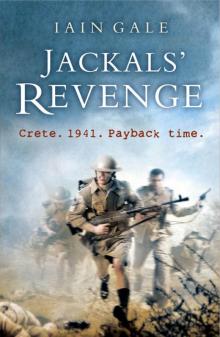 Jackals' Revenge
Jackals' Revenge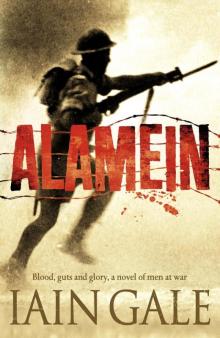 Alamein
Alamein Conspiracy
Conspiracy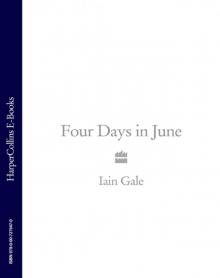 Four Days in June
Four Days in June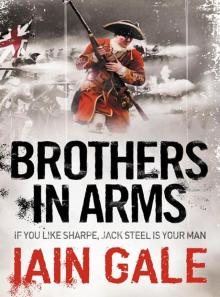 Brothers in Arms (Jack Steel 3)
Brothers in Arms (Jack Steel 3) Brothers in Arms
Brothers in Arms 02 - Keane's Challenge
02 - Keane's Challenge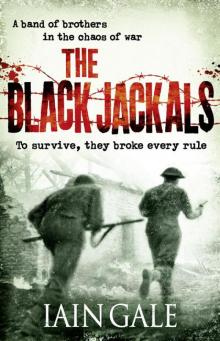 The Black Jackals
The Black Jackals Man of Honour
Man of Honour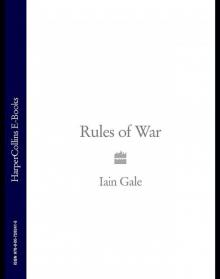 Rules of War
Rules of War